SOME HUMANS ARE STUCK IN THE SPOILERS!
Sometimes when a Star Trek episode begins, you just know in the first few seconds (maybe minutes) that it’s either going to be really good or not. Last week, I kinda felt a disturbance in the force as soon as we were halfway through the interminably long 5-minute scene of Picard taking to the Starfleet shrink (whom we later discover is really his father). Despite watching two brilliant British thespians (SIR PATRICK STEWART and JAMES CALLIS) linguistically duel in trying to psychoanalyze Jean-Luc Picard, as the scene dragged on, I found myself not buying what they were selling…even though I should have. And things didn’t get much better for me from there.
Now, I understand that many people actually enjoyed last week’s episode—and man, did they let me know how “wrong” I was on Facebook! Next to global warming, war, overpopulation, pollution, the pandemic, and reality television, I think the greatest threat to our species is vanishing civility! But I digress…
Whether last week’s episode of STAR TREK: PICARD was truly bad or good, the fact remains that this week’s eighth episode, “Mercy,” was unquestionably amazingly wonderful from the very first moment. (And with that, I am sure a whole bunch of Facebook warriors will again let me know in as nasty a way they can how wrong I am!)
Actually, I always read through a number of reviews before writing mine—as I don’t like to just repeat what everyone else is saying—and while most reviewers agreed with my critical response to last week’s episode, this week a large number of reviewers weren’t nearly as impressed as I was. (Although one was totally on the same page.)
Many of them felt this episode was mainly filler, moving the subplots along toward the inevitable final two episodes and the “big finish.” Some felt like this whole season was caught between wanting to tell a cohesive story while simultaneously throwing in so much extraneous stuff that many scenes dragged or felt like time that could have been spent on other things.
I might talk about this more in my final review of the season, but I suspect people are—sadly, because of the reality Paramount+’s schedule—watching season two in the wrong way: one episode at a time. What I’ve noticed about season two (even more so than season one) is that this appears to be an 8-hour “movie.” There’s a lot of those on streaming TV these days, but the problem is that watching an 8-hour movie over ten weeks is a completely different experience than binging it…and I think Picard was written to binge-watch.
That said, as a self-contained 47-minute viewing experience, “Mercy” was a very well-done episode. It also provided us with the overarching theme of this season, which I’ll get to shortly. But first…
OH, THAT ACTING!
Even the biggest critics of this season (both those with blogs and just those with keyboards) aren’t complaining about the acting on this series…and well they should NOT! The acting on Picard is phenomenal by everyone involved…both the regulars and the guest stars. In particular, JOHN de LANCIE is killing it as Q. He is Q—and in a completely new phase of his life: dying. De Lancie’s monologue to Guinan during their amazing scene together conveyed all the anger and frustration as any older person would have realizing that their best days are now behind them and they cannot do or be the things they used to. And this frustration and resentment is combined with a perhaps-naive hope that there will be something better, nobler, and grander once they throw off this mortal (or immortal) coil…rather than simply the abyss of oblivion.
And speaking of Guinan, how amazing is ITO AGHAYERE as her younger self? Obviously, with her contracted responsibilities hosting The Voice, WHOOPI GOLDBERG wasn’t going to be able to play our favorite El-Aurian bartender for the entire season. But if you can’t have Whoopi, then Ito is the next-best thing in so many ways. Her performance embodied the quiet, matter-of-fact confidence thatt Whoopi brought to the role. And the way that Ito so easily slipped into listener/observer mode when talking to Agent Wells (more on him shortly) to use her “superpower” on him was inspired. Ito’s scenes with him, with Sir Patrick, and wit the amazing John de Lancie brought a satisfying richness to this episode that payed off big time in terms of viewing enjoyment.
Next up is BRENT SPINER, who is giving so much to this role of Adam Soong. You might not realize this—because Brent is making it look so easy!—but Adam Soong is actually a very demanding part to play. Viewers need to be convinced that Soong is a schmuck, but he can’t simply be a mustache-twirling “bad guy.” We had to feel his fatherly love for Kore…at least at first. He needed to sell his devotion to his “daughter” prior to this. That scene in episode 5 where Kore goes swimming in the sunshine was a look of pure joy on Soong’s face. We believed he was a parent showing relief and gratitude that his child would finally have a normal life.
But in this episode, without changing the nature or tenor of the character, Brent now had to convince us that his real love was for himself, his legacy of greatness, and his work. His “love” for Kore wasn’t pure but rather tainted by ego. And even worse, Soong is too wrapped up in himself to understand the difference. All of this Brent Spiner was able to convey brilliantly, likely with spot-on input from veteran director JOE MENENDEZ (who did not impress me last week but blew me away this week!).
And finally, a shout-out to Dr. Teresa herself, SOL RODRIGUEZ, who has such amazing chemistry with SANTIAGO CABRERA’s Captain Rios that I almost want the next Star Trek series to be a spin-off of them and her son Ricardo doing…well…anything. I’d watch them eating dinner and talking about school and the clinic, for gosh sakes! Although Sol’s career only spans a mere decade at this point, it is obvious to me that this amazing Argentinian-Italian actress will go very far in Hollywood and beyond.
And that’s only the guest stars! The series regulars are also hitting it out of the park…all except poor poor, dead Elnor. EVAN EVAGORA really needs to find a new agent, as he’s getting totally short-changed this season. With two episodes remaining, he’s been relegated to brief flashes of cameos ever since Elnor died in episode 3. “Mercy” was the first time we saw him speaking in five episodes, and the scene wasn’t even that good. In fact, the flashback to Raffi manipulating Elnor into staying at Starfleet Academy was the only part of this episode that I thought was weak. I mean, I understand why the scene was there, as they’re trying to explain why Raffi blames herself for Elnor’s death. But it just felt bland and shoehorned into an otherwise gripping and dramatic episode.
NO BLOODY A-, B-, C-, D-, OR E-STORIES…KINDA
As I’ve mentioned in some of my DISCOVERY reviews, Star Trek (and other show’s) writers often divide up episodes into separate storylines. That way, the action can toggle between and among different characters and plots, keeping the pacing fresh and the viewers engaged. And sometimes these A-, B-, and sometimes C-stories intersect a little, but usually not.
This latest episode, however, most assuredly had the various storylines intersecting and overlapping…so much so that it eventually became difficult to figure out where one story ended and the next one began. As such, I can’t simply talk about the A-story of Picard and Agent Wells because it divided off into the scene of Guinan with Q. I can’t talk only about Queen/Agnes or Raffi and Seven’s search for her without also tying in the meeting between Queen/Agnes and Soong…which needs to intersect with discussions of Kore. The only story truly off on its own was Rios and Teresa on the La Sirena.
So instead of talking about the A-story, B-story, etc., let’s just talk about what happened with the characters in the episode…
GUINAN AND Q…TOGETHER AGAIN!
Back in the days of Next Gen, Guinan’s history was a delicious mystery. Only small, tantalizing tidbits were revealed in episodes like “Q Who” (Guinan’s people have a history with the Q, and Q himself does NOT like Guinan but seems to have no power over her), “Yesterday’s Enterprise” (Guinan has some temporal sense that perceives beyond one timeline) and “Time’s Arrow” (Guinan spent time on Earth when she was much younger—like 500 years younger!—and met Picard in San Francisco in 1893). And then there was her brief appearance, along with fellow El-Aurian Dr. Tolian Soran, in Star Trek Generations.
Q’s history was even more of a mystery, and what we learned of him and his race in TNG, DS9, and Voyager could fill an encyclopedia (or wikipedia)…only with most of the pages left blank.
So seeing these two characters together in an emotionally intense scene was glorious! And even though the writers are providing more details about the mysteries of these two powerful beings, those details are only opening the doors to more mysteries. How is it that an omnipotent “immortal” being can die? How powerful are Guinan’s people if the Q can’t obliterate them and can summon them at will? And the summoning is non-negotiable—a Q has to come when called, even if it means dealing with Los Angeles traffic at rush hour! (Good thing Q wasn’t traveling from Sri Lanka!) And if Guinan’s people are that powerful, how did the Borg nearly wipe out their race? Why didn’t the Q help them while the Borg attacked? Did they refuse? So many compelling questions!
But the most compelling things happened all-too-quietly. The first was Q’s revealing the “theme” of the entire season: “Humans are all trapped in the past…” and “The trap is immaterial—it’s the escape that counts!” And later, Guinan is reminded of how truly special and unique humanity is in wanting to better ourselves. “When something inside you is broken, it stays with you. You live in the past until you’re able to reconcile it. Even if it’s painful, you do the work because you want to evolve.”
Welcome to the message of Picard season two, my friends!
A few weeks ago, one of my regular readers suggested that the theme of this season is fear. Everyone is afraid of something. But that feels too dark. Much more hopeful is the idea that, yes, we are all stuck in the past in some way—Picard and his mother, Seven and her time as a Borg, Raffi and the death of Elnor, Rios’ soulful search for a father figure, Agnes’ insecurity after a lifetime of not being noticed, Renée Picard’s self-doubts, even Adam Soong’s many failures. Each of them is faced, this season, with the choice of remaining trapped in their past trauma or facing their demons and evolving as people. Perhaps even Q—suddenly human” and limited to only one “lifetime”—is now looking to redeem himself after an endless existence of meaningless mischief and irresponsible whimsy.
ALL’S WELLS THAT ENDS WELLS
So it turns out that actor JAY KARNES was not reprising his Star Trek: Voyager role of 29th century Lt. Ducane from the Federation timeship Relativity. And that’s probably a good thing, as several readers pointed out to me that if the Confederation future is intact, then there’s probably no Federation timeship Relativity to travel back in time to 2024. Of course, it was an author by the name of Wells (Herbert George Wells, to be precise) who wrote the classic sci-fi novel The Time Machine.
But instead of a time-traveler, we get an intriguing character—a Fox Mulder-homage with a little less DAVID DUCHOVNY sexiness and a little more Willy Loman pathos. In many ways, Agent Wells is the most Star Trek thing about this latest episode. Think about it. A very typical Star Trek trope is for a “damaged” guest star character to pop in for an episode, encounter our crew, and come out of their shared experience somehow better than the way he/she/they entered.
Wells is an intriguing character. Like everyone else in this episode, he is also trapped in his past, a failed mind-meld followed by a lifetime of fruitless obsession. Having rewatched the episode, Picard is likely never truly afraid of Wells because he knows all along that the FBI agent is a small man only trying to appear threatening. But Wells is keeping them in custody, and there is the risk he will cause the Europa launch to be delayed or scrubbed.
However, in the end, it is Picard who is able to help Wells escape his own mental trap. Despite the whole “butterflies” warning, once again a character from the future spills the beans. But this time, Picard is correcting a wrong, righting an injustice. The failed mind-meld has scarred Wells, and only by telling him the truth can Picard fix what once went wrong. In this case, sharing the secret becomes a noble act. And then in return for releasing Wells from his own trap, Wells releases Picard and Guinan…although he has been fired. But perhaps that, too, a a release from a trap that been holding Wells back.
(Oh, and while there weren’t many easter eggs this episode, there was a groovy one. Based on Wells’ probable age—late fifties—his childhood encounter with the Vulcans likely happened in the late 1970s. That’s about twenty years after the events in the Enterprise episode “Carbon Creek” in 1957. At the end of that episode, it was revealed that another Vulcan survey ship would visit Earth in…20 years!)
SAD SOONGS SAY SO MUCH…
After a total absence last week, the Soongs are back, and there’s gonna be trouble. As I already said, we got to see Brent Spiner giving some amazing depth to Adam Soong, but we also got to see ISA BRIONES developing the character of Kore a bit more. That said, this was probably the weakest of the storylines to get attention this episode. It definitely helped to better define Adam as a heavy, but it’s still a little hard to figure out Kore. I mean, yeah, she’s pissed off that her dad lied to her all these years and doesn’t seem to love her as much as what she represents, but I’m not really sure she’s completely thought through this whole “storming off in a huff” thing.
Remember: she never goes outside, so she doesn’t really understand how hot the asphalt of Los Angeles gets in the sun…NOT a place for bare feet! She has no money or credit card (why would she ever need it?) and probably no ID. And worst of all, a guy she’s never met before who appears as a virtual avatar in her VR program offers her “freedom” in the form of an unknown injection. The last time she had such an injection, it lasted only a matter of minutes and then she almost dies. Again, is she really thinking this through?
And if Adam Soong has access to an ex-military strike force, how come he isn’t calling up one of them to follow his life’s work and keep her safe?
AH, LOOK AT ALL THE LONELY PEOPLE…
One of the more interesting aspects of this episode is how the traumas of the past keep people from connecting to others. In short, being “trapped” leads to loneliness. I mean, ah, look at all the lonely people…
- Jean-Luc Picard – doesn’t find love ’cause he’s hurting from losing his mom—nothing but qualm.
- Annika Hansen – carries the deep scars of losing her life to the Borg, but now she’s restored (or is she?).
- Raffi Musiker – holding her anger inside because Elnor has died and now she can’t hide…why hasn’t she cried?
- Cristóbal Rios – wasted his time on a series of loves that don’t last, will he stay in the past?
- Agnes Jurati – didn’t connect, didn’t love, till she let in the Queen…and now she’s so mean!
All the lonely people, when did they all come from? Okay, that’s enough parody Picard Beatles lyrics. Enjoy having the song stuck in your head, folks.
Anyway, each of these characters became so much more interesting this episode…and you might not even have noticed how much! I mean, Jean-Luc Picard has always been an interesting character, but watching Seven and Raffi together provided some amazing insights. Seeing Seven get in touch with her “inner Borg” showed how haunted she still is by that terrifying assault of first being assimilated. And we also learned why you should always dispose of lithium batteries properly lest the Borg Queen use them to create a Seal Team 6 drone army.
Meanwhile, we also got some insight into Raffi after Seven exploded at her. While the flashback with Elnor dragged, the whole dynamic with these two women and their relationship has become a welcome core aspect of this season. As I’ve said before, the writers know they made a mistake with throwing in that hand-holding scene in the final seconds of last season. “Oh, Raffi and Seven are a thing??? Who knew!” But now we’re getting a chance to see the two of them earn their coupling. Relationships aren’t all magical romantic moments covered in flower petals, chocolate sauce, and whipped cream. Sometimes they take work…and pain. And sometimes you can only escape from your own trap if someone helps you out of it.
And that, my friends, is the second half of the theme of this season!
SUPER-VILLAIN TEAM-UP
I’ll reserve comment on the big cliffhanger ending to see where it goes. It seems a little convenient that Adam Soong just happens to have his own satellite network and immediate access to a small army of mercenaries (or whatever they are). But I will give actress ALISON PILL major props for so perfectly nailing ANNIE WERCHING’s portrayal of the Borg Queen (along with delivering some very fun lines)
Obviously, they’re setting up the big two-episode sprint to the finish. This is where season one stumbled big time, but maybe the second time’s the charm. The pieces are all in place for a battle royale of good versus evil with the fate of humanity in the balance…again. And then there’s Q and whatever needs to happen with him. There’s all the lonely and damaged main characters, plus Renée and Kore. And I suspect that we’ll see Agent Wells again—along with Guinan and Taillinn, as well.
All hands on deck for the big finale! Bring it on…

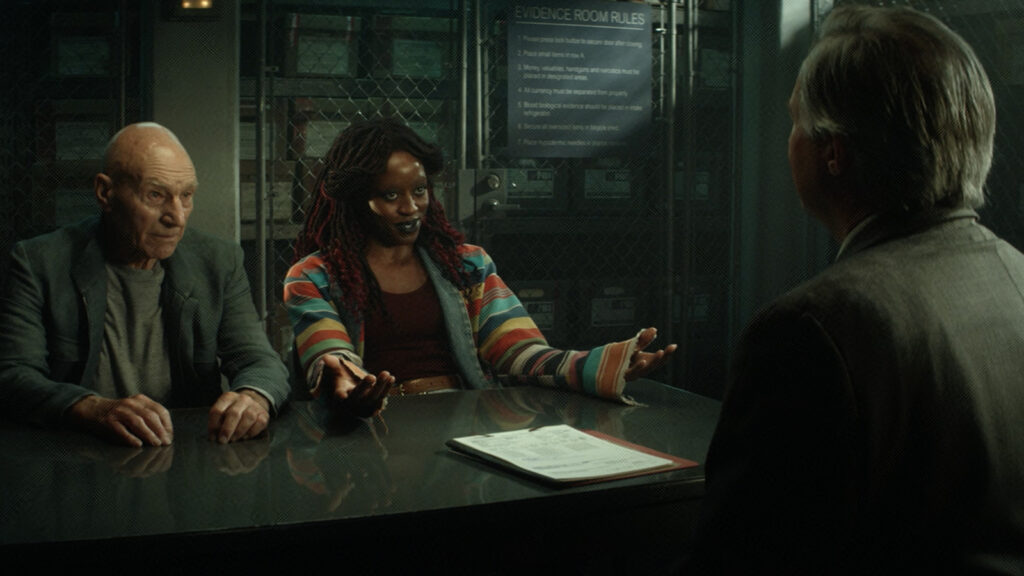
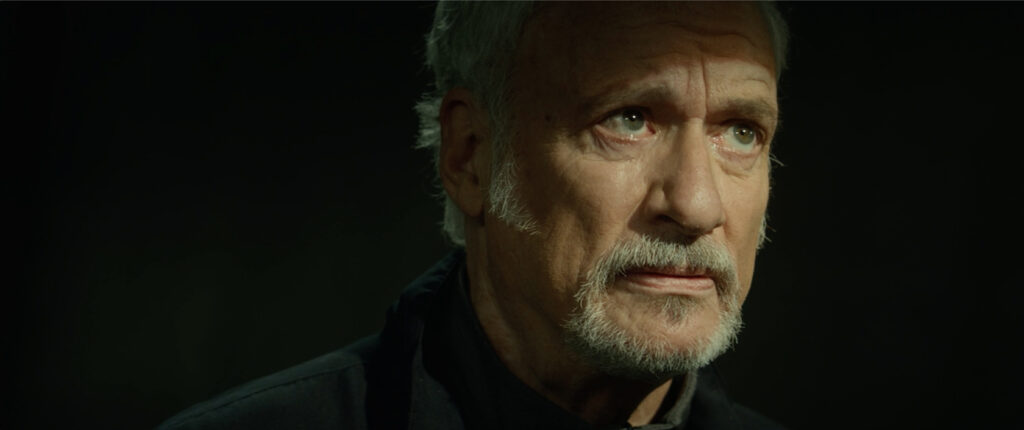
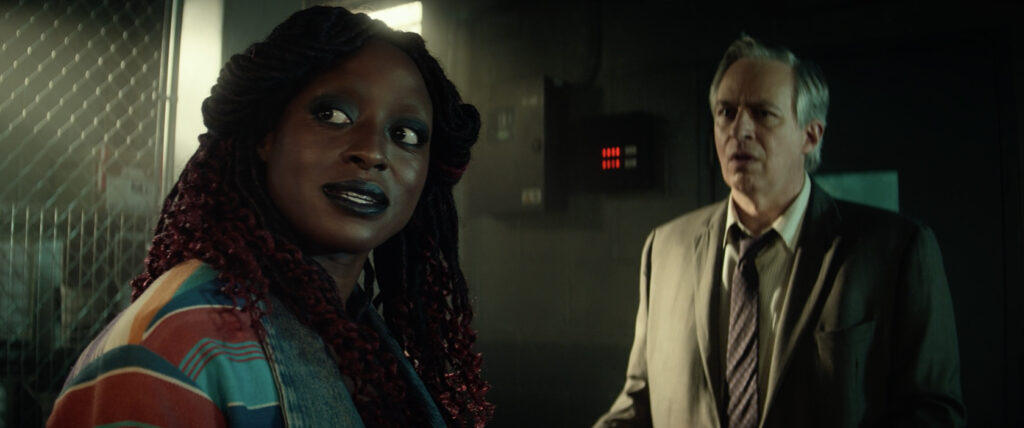
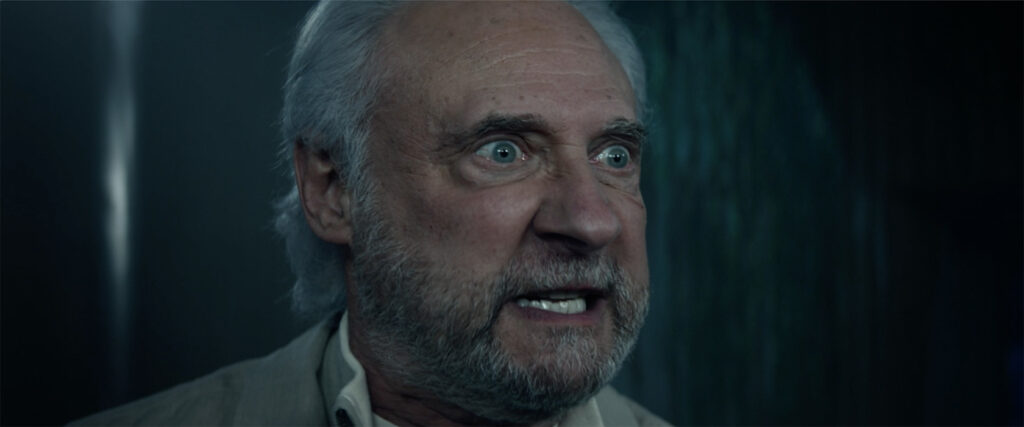
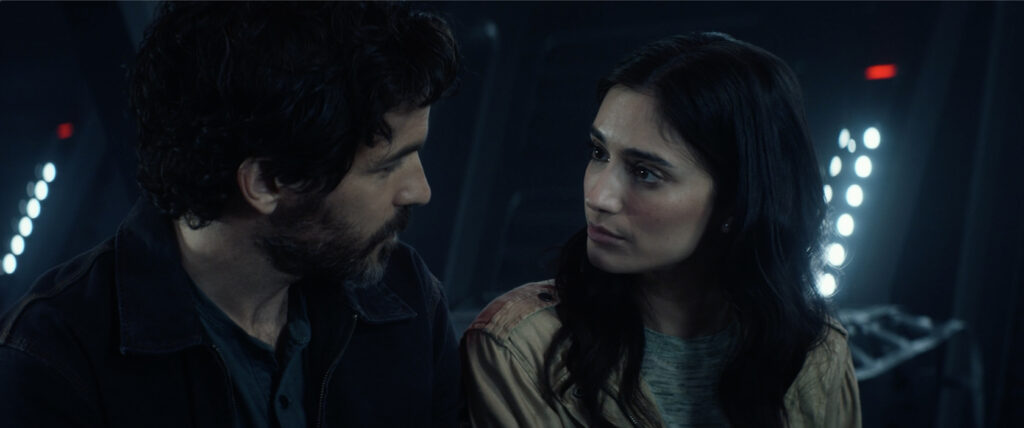
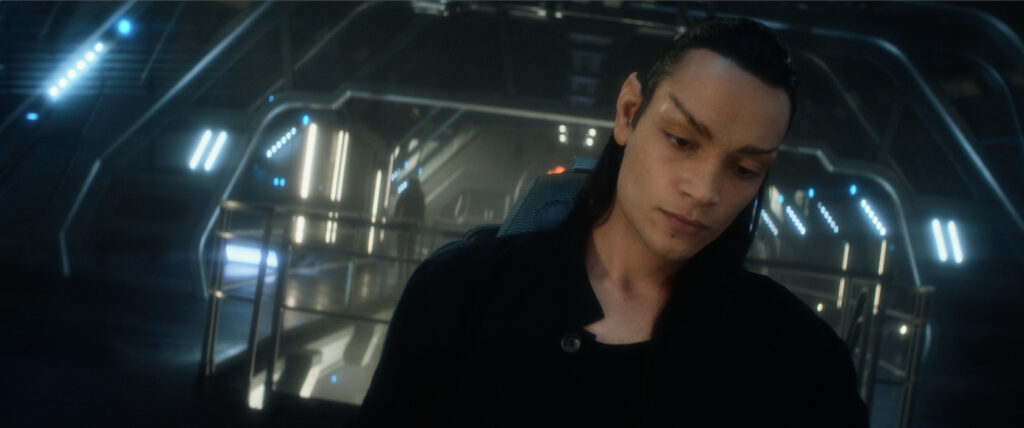
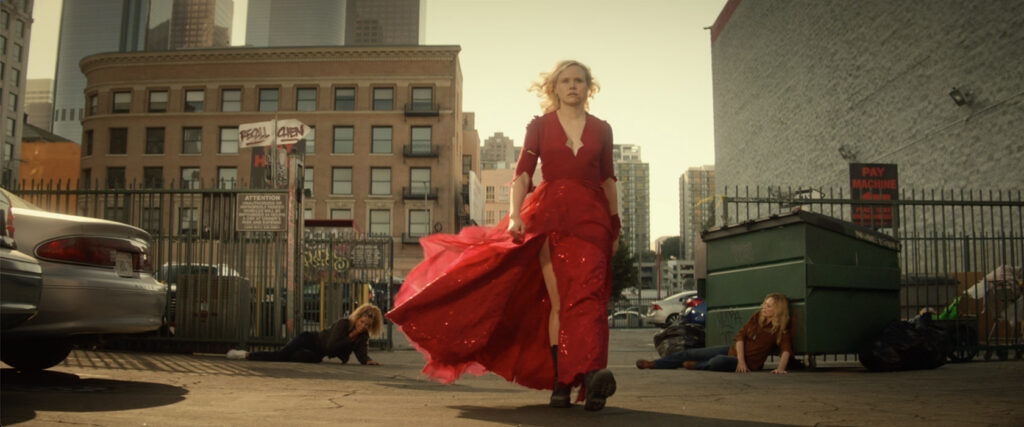
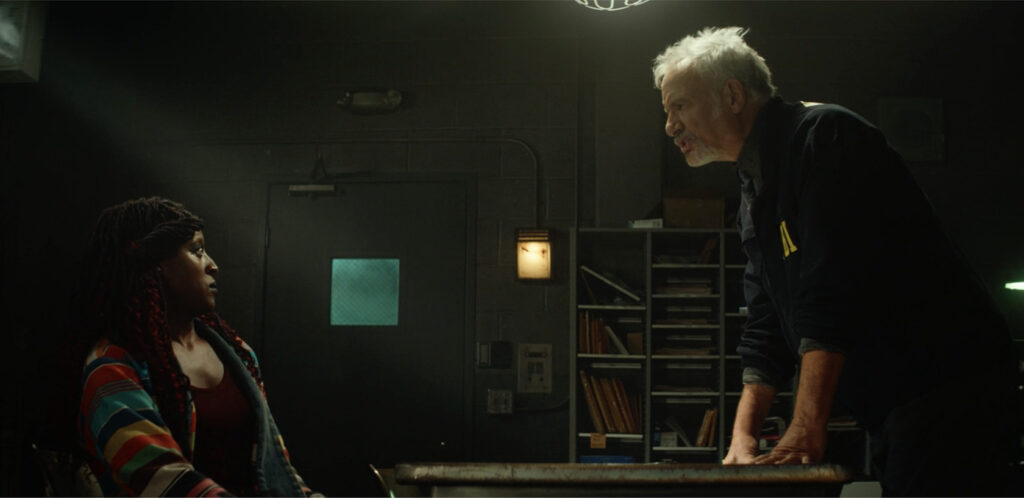
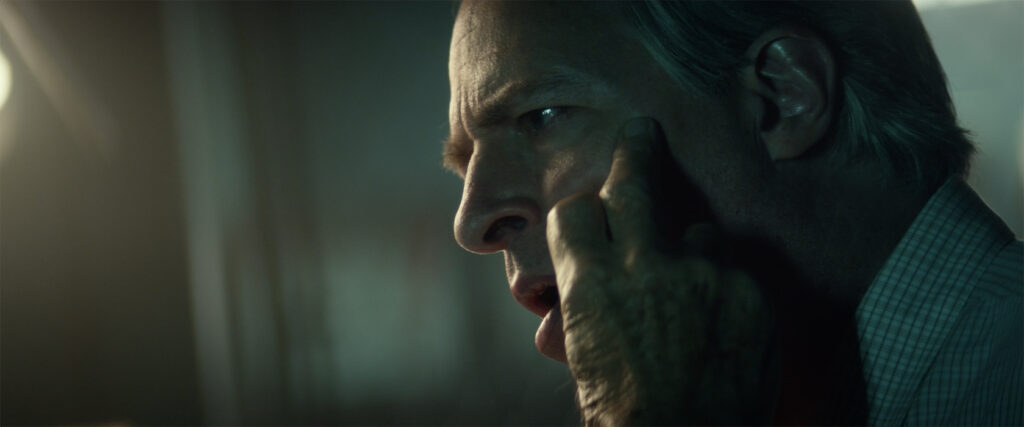
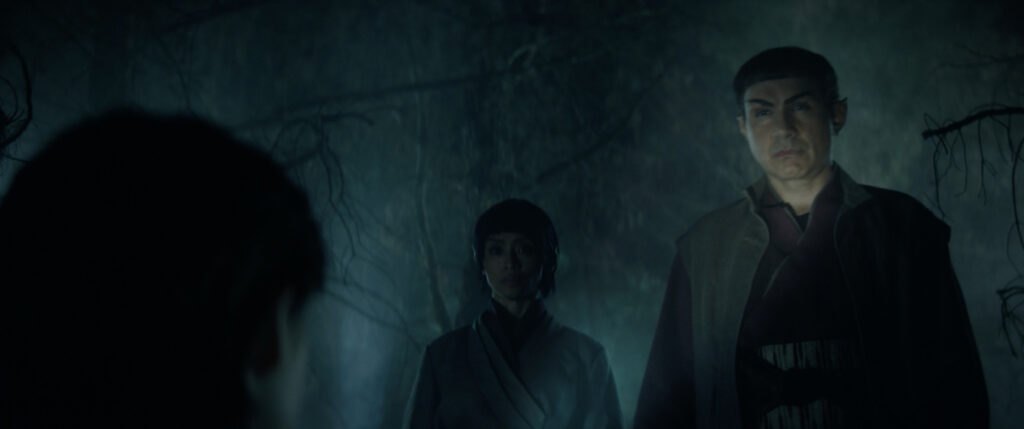
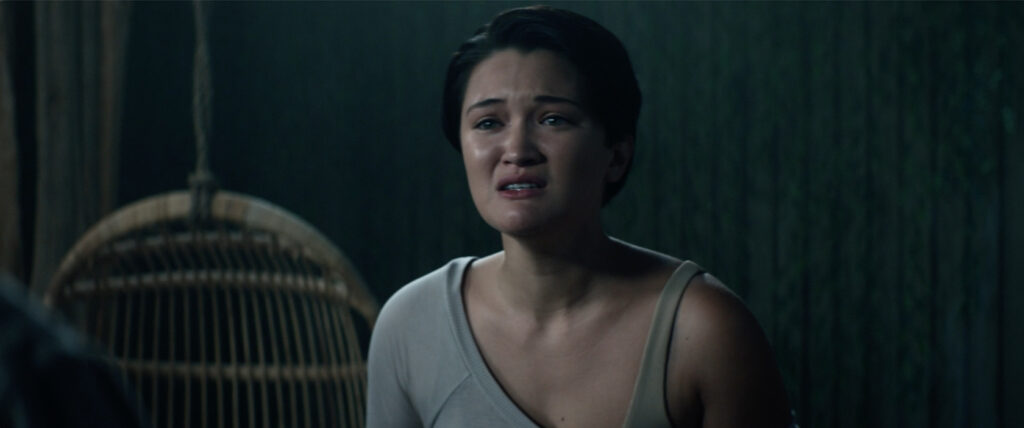
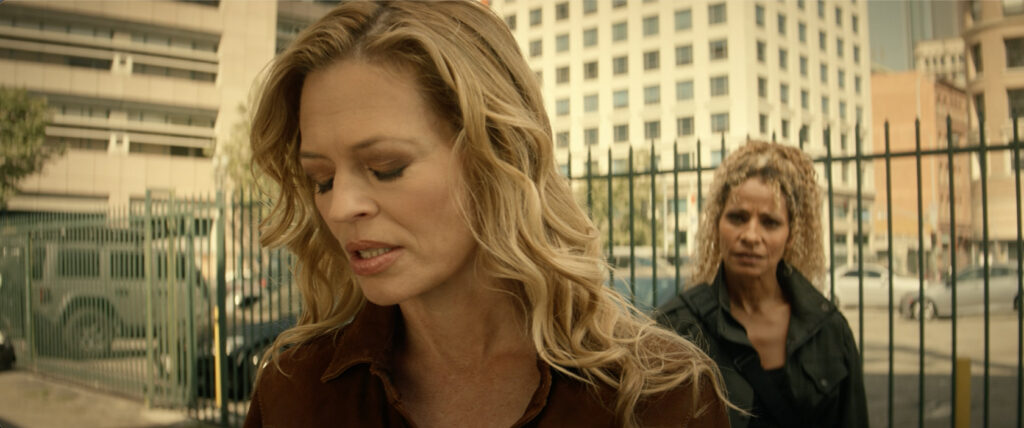
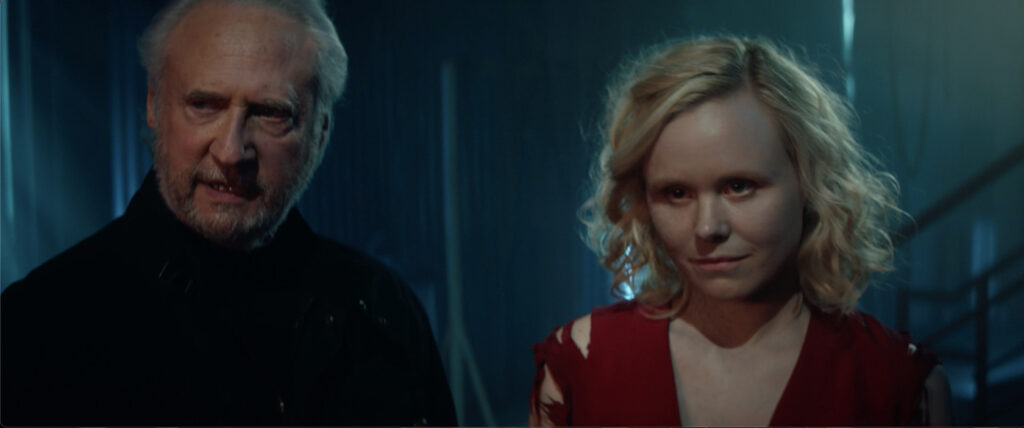
To it being a movie – yes – and that’s why I complained about a non-cliffhanger episode ending earlier.
The theme: “Humans are all trapped in the past…” and “The trap is immaterial—it’s the escape that counts!” I would add that trauma and resulting emotions including fear is part of the trap.
As to aging? “… all the anger and frustration as any older person would have realizing that their best days are now behind them and they cannot do or be the things they used to. ”
I’ll quote Robert Browning: “Grow old along with me! The best is yet to be, the last of life, for which the first was made. Our times are in his hand who saith, ‘A whole I planned, youth shows but half; Trust God: See all, nor be afraid!”
At age 76, I’m not angry at my growing older and only a bit frustrated when my body argues with me. In fact, I’m enjoying myself more than I did when I was in the work world.
That’s good to hear, Jerry. I wasn’t thinking about Q as a 76-year-old so much as a 90-plus-year-old…the age when you no longer know whether or not you need to go to the bathroom because the neurons that carry those messages to the brain have worn out. The age when you start forgetting how to wash your hands or need someone’s help getting up from the toilet. Getting old is indeed a gift, but it can also be a double-edged sword depending on the person you are and the people around you.
Hey Jonathan, may I tell how terribly wrong you are. 😉
I had the opposite experience, for me it should absolutely NOT get binge watched. This season feels like a white wine meant to get sipped and savoured to fully experience all if its delicate flavours. I started this season late so I binged the the first half and that was a mistake. There exists so much in this season and it needs time to digest; Guinan, Q, Soong, the supervisors/watchers, Renee Picard; one needs time to soak it all up. 🙂
Most of the episode I loved though, I didn’t think about Kore going off like that, she doesn’t know what she doesn’t know about the world, she has lived a sheltered life so her going off like that felt okay to me.
I wasn’t sure about the Vulcan aspect of this episode, I mean Broken Bow was set in 2151 and mind melds were seen as not only a taboo but a crime with few people able to do them without causing harm to others. With this taking place as you say “in the late 1970s”, that means 180 years for something to become a taboo like that, which doesn’t sound that long given that a Vulcan has a lifespan of two hundred years or more. I can understand a change in governmental policy about visiting other worlds for research, but mind melds going from commonly used to a mostly forgotten dark art well within a lifetime, I find that difficult to believe. But I do love the Mulder aspect and was thinking that during the show! Amazing! 🙂
I think Vulcan mind-melds evolved as Star Trek evolved, not as Vulcan evolved. Yes, the first mind-meld in “Dagger of the Mind” was shrouded in awe and mystery as ancient “Vulcanian” mojo seldom used. But it didn’t take long for mind-melds to become nearly as common from Spock and other Vulcans as a neck-pinch. I think Star Trek now sees mind-melds as just another superpower that Vulcans have and not some kind of “taboo” or a “crime.” I think the closest a mind-meld ever came to being a crime was when Spock ripped the identity of the conspirators out of Valeris’ mind…almost a mind-rape, in my humble opinion. Did the ends justify the means? Not sure. It’s only a TV and movie franchise after all, right? 😉
“{90-plus-year-old…the age when you no longer know whether or not you need to go to the bathroom because the neurons that carry those messages to the brain have worn out. ”
My father-in-law died at age 92 with full mental acuity. He was making money in the stock market up to the very end as well as doing woodworking taking walks, making his own meals outside of having dinner with us frequently and so forth.
So my advice: don’t be a pessimist about age. And maybe that’s another subtle message about Picard, Season 2: don’t fear or hate getting older even if we think about our 90’s. We never know what’s going to happen.
True…although that same thing happened to two of my father’s three brothers (the third died at 67) and is currently happening to my own father.
“True…although that same thing happened to two of my father’s three brothers (the third died at 67) and is currently happening to my own father.”
I’m sorry to hear that. It makes your comments perfectly understandable. May a cure be found very very soon.
Good ol’ Alzheimer’s. When the brain lives past its freshness date…